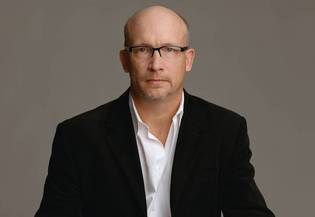Interview: Alex Gibney on Exposing the Catholic Church and Giving Voice to the Deaf in "Mea Maxima Culpa"
By Guy Lodge
Sign up to get the latest updates instantly. Sign Up > More Instant Alert Options > From misplaced questions to accidental transcription errors, interview fumbles are obviously to be avoided under any circumstances, but you particularly want to be on your game when the subject is one of America's preeminent documentarians – someone whose own profession is built on a level of journalistic expertise. So you can imagine my mortification when my iPhone recently took it upon itself to wipe its own memory clean – deleting, among other things, all aural evidence of my face-to-face conversation with Alex Gibney at last month's London Film Festival. The prolific filmmaker, an Oscar-winner in 2007 for his devastating legalized-torture study “Taxi to the Dark Side,” was in town for the European premiere of his superb new film “Mea Maxima Culpa: Silence in the House of God,” which would win him the festival's Best Documentary award the very next day. The film, which hits US theaters today, is not the first to examine the horrific history of sexual abuse within the Catholic Church, but it is arguably the most penetrating, methodically tracing a dense network of crime and cover-up all the way from Milwaukee to the Vatican itself. It could well earn Gibney a deserved third Oscar nod. Speaking over the phone from his New York office earlier this week, Gibney casually waves off my apologies for having to restage the interview. “Trust me, I've been there,” he says with a light laugh, his crisp, deliberate voice sounding rather less exhausted than it did in the bar of London's Mayfair Hotel a month ago. It's hard to imagine interviews – or any information, for that matter – slipping through the director's fingers, so keen and diligent is his filmmaking style across a broad range of subjects, from the fall of Enron to the fizz of Hunter S. Thompson. “Mea Maxima Culpa” is among his most perspicacious works: weaving a profoundly moving story of human heroism through a tough-minded analysis of a global scandal, he carves out new angles in a story he admits initially fearing had already been adequately exposed. “I was in two minds about it, to be honest,” he says, remembering when producer Todd Wider came to him with New York Times journalist Laurie Goodstein's story about Father Lawrence Murphy, a priest revealed to have molested hundreds of boys at a school for the deaf in Milwaukee, and the four victims who labored for decades, in the face of clerical and governmental indifference, to bring Murphy to justice. “On the one hand, I felt an awful lot had already been done on the subject. At the same time, I'd been raised Catholic and thought that if there was something new I could contribute, I should do it.” Digging further into Goodstein's story, Gibney found himself intrigued by the documented connection between crimes in Wisconsin and the Vatican, and the challenges of playing an intimate human tale against a larger international expose. “It was a good opportunity to get a greater understanding of the Vatican's role in the cover-up,” he explains. “And the third reason I decided to do it, though it took a little longer to understand, was the heroism of the survivors themselves – these four deaf men. In the midst of this very dark story, there was something there to celebrate.” Introducing the film at its first London screening, Gibney quipped, “I was raised Catholic, and this is the result.” He may have delivered the line flippantly, but the director insists that his Catholic upbringing – though he now regards himself as lapsed – had a significant bearing on the film. “It might kill you to say it, because the film really takes on the Catholic Church, but I do think there is a sort of affection for certain rituals, and an authenticity to the presentation of those rituals, in 'Mea Maxima Culpa',” he says. “It's a kind of shorthand for the emotional identification that Catholics inevitably have with their church. I think the Catholic Church is quite consciously extreme in some ways, because that identifies its followers with a very peculiar kind of tradition. There's not a lot of difference between a lot of forms of Protestantism, but if you're a Roman Catholic – particularly of my generation, raised at a time when you could still go to the Latin Mass – there's an intense emotional connection with that, even if you're not still devout.” “It's not 'Religulous',” he remarked on our first encounter in London, referring to Bill Maher's unsupportably snide anti-religion tract released in 2008. “It's not even about religion per se; it's about the abuse of power, the abuse of faith. And I think it would be quite easy for other filmmakers, who weren't raised with the religion, to be more mocking of the liturgy itself, and less understanding of the way that liturgy actually insinuates itself into your character.” As if to demonstrate that such horrors are hardly limited to the Church, the sexual abuse scandal currently rocking the BBC in the UK offers some timely parallels with the situation explored in Gibney's film. “It's disturbing, but at the same time kind of gratifying to see these stories breaking open. I think for a long time they were held in check, and the silence was the thing that was most pernicious. Victims were afraid to come forward, often against people who had these immense reputations – something you also see in the Lance Armstrong story. They were discredited. So you see how the reputations of powerful institutions act to silence people.”
|
.
Any original material on these pages is copyright © BishopAccountability.org 2004. Reproduce freely with attribution.
